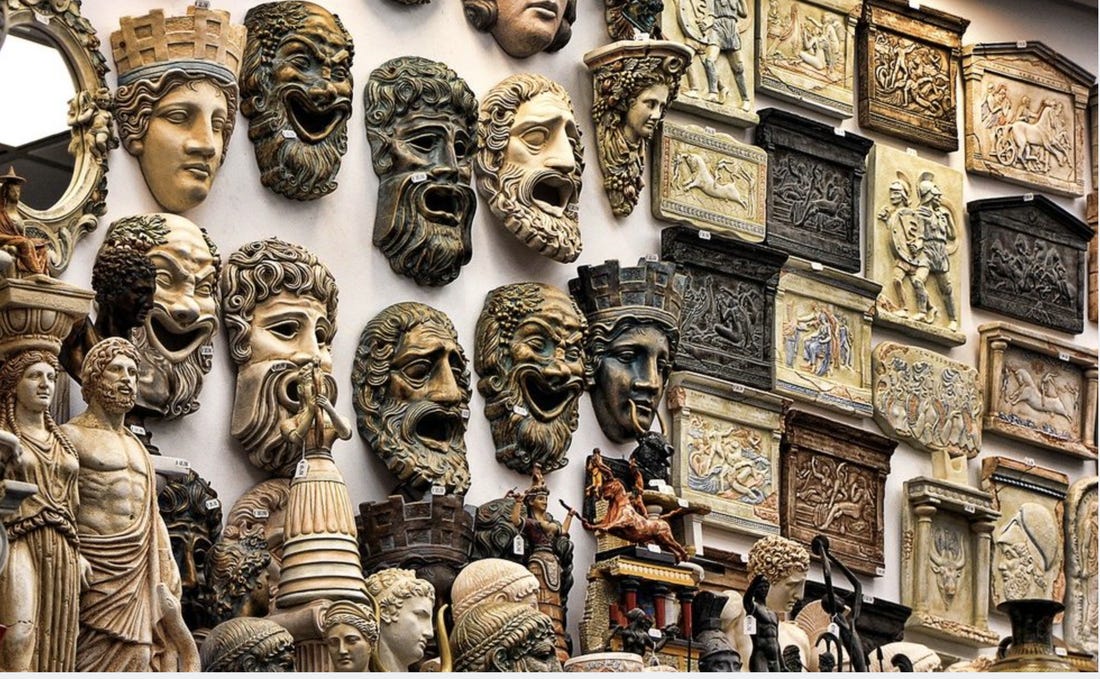Nothing vast enters the world of mortals without a curse —Sophocles

I like the quote but don’t recall much about Athenian tragedies. Apparently Sophocles was a bit of a naysayer or to use BCE lingo (before the common era)--a tragedian. I have a mist of recall around his magnum opus, Oedipus. The main point being if you defy the gods, prepare to suffer the consequences. Oh. And the king of Thebes (Oedipus) accidentally kills his father and marries his mother so there is that.
Continuing our theme of old is new again or “there is nothing new under the sun (Ecclesiastes 1:9)” creates the perfect segue to describe the main themes of a thought provoking documentary on Netflix. The Social Dilemma.
...The collective lack of understanding about how these platforms actually operate has led to hidden and often harmful consequences to society—consequences that are becoming more and more evident over time, and consequences that, the subjects in The Social Dilemma suggest, are an existential threat to humanity.--Netflix
After watching this movie you have to let it set in. How much of your behaviors are you willing to change? What curse has the ease of connectivity rained upon o' house? I doubt that any of us don’t know that we are the product being sold on these “free” platforms. But I’ll be darned if they aren’t entrenched into our lives in a seemingly intractable manner.
I am proud to say that I haven’t allowed notifications on my phone almost ever. I do get my texts because my family prefers them and there is an added bonus when I go on long runs. Siri whispers my texts into my ears. What could go wrong, right?
I also have disabled every modifiable opt-in, ad notifier, or tracker humanely possible. The list of apps requesting microphone or location permission is simultaneously funny and terrifying. I am talking to you Dropbox.

Here is another final push. Work more often on your platforms. Your website, your blog. I think I came to Instagram too late to see it as a business need. I post mostly when I travel but that has morphed into what I see along the trail or what I ate.
Super newsworthy.
In my experience, LinkedIn works as a conduit for messages to reach you. Many new clients simply reach out by message so that is the biggest advantage I can see there. Not much more.
Do you host webinars or synchronous/asynchronous meetings? The evolution of virtual commerce allows many of us to adapt and customize how we bring value. We have become Zoombies but maybe Loom can do some of that heavy lifting? I have been using it more and more when creating instructional asynchronous learning--check it out here.
Are there any lessons about connecting in a remote world to be learned from the past?

Well it just so happens...
A Medieval Mother Tries Distance Learning
Esther Liberman Cuenca, September 17, 2020 Paris Review
This amused me. I am not sure why my mind has been wandering back so far--to times of pestilence, depravity, and demise of civilization--oh. wait.
Instead of Zoom, teachers in the Middle Ages had a feather off a bird and a sheet of parchment, and when the lesson came, it plopped down in front of you as a hundred-and-twenty-page Latin manuscript. And just what was a medieval mother’s education curriculum for her son?
Here is a simplicity we can embrace. Unplug and take a walk.
How you manage to pluck the feather off the bird is up to you but this is likely the only way to get off the grid.

That is what the duchess, Dhuoda of Uzés, decided to gift her son. The Liber Manualis is a handbook of her wisdom, one that he should read, internalize, and apply to his own young life to navigate the complicated feudal politics of the age...He eschewed all her good advice on being a good vassal to his lord and got himself killed during a rebellion against Charles seven years after receiving her book. So Dhuoda’s curriculum didn’t help William much, in the end. But maybe it helped me understand, here in 2020, with schools shuttered for the fall semester, that advice given at a great distance can only ever go so far.
We can choose to heed warnings about our reliance on technology. I can’t remember the source of the advice but a conversation about AI and healthcare that seems so simple--if more folks would listen. Be cautious of AI that increases the distance between the patient and the provider. This is a metric I use when exploring biased algorithms and “shortcuts” in diagnostic pathways.
It is you, whose fate is grievous, who have chosen this; this fortune has not come to you from one more powerful; for when it was possible to show good sense, you chose to approve the worse, rather than the better fate.
(1095-1100, Philoctetes)
The newsletter--always free if you subscribe during September.
This blog stays free (and also ad free) but mumble|delegate|ponder will become paid (low cost but high value)...
Current subscribers will need to opt in to retain free status (simply hit subscribe).
Existing paying subscriptions have been automatically converted to new format.

